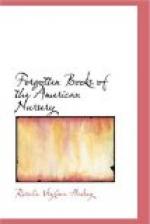Franklin undertook to better this condition by opening a shop for the sale of foreign books. Both he and his rival in journalism, Andrew Bradford, had stationer’s shops, in which were to be had besides “Good Writing Paper; Cyphering Slates; Ink Powders, etc., Chapmens Books and Ballads.” Bradford also advertised in seventeen hundred and thirty that all persons could be supplied with “Primers and small Histories of many sorts.” “Small histories” were probably chap-books, which, hawked about the country by peddlers or chapmen, contained tales of “Fair Rosamond,” “Jane Grey,” “Tom Thumb” or “Tom Hick-a-Thrift,” and though read by old and young, were hardly more suitable for juvenile reading than the religious elegies then so popular. These chap-books were sold in considerable quantities on account of their cheapness, and included religious subjects as well as tales of adventure.
One of the earliest examples of this chap-book literature, thought suitable for children, was printed in the colonies by the press of Thomas Fleet, already mentioned as a printer of small books. This book of 1736, being intended for ready sale, was such as every Puritan would buy for the family library. Entitled “The Prodigal Daughter,” it told in Psalm-book metre of a “proud, vain girl, who, because her parents would not indulge her in all her extravagances, bargained with the devil to poisen them.” The parents, however, were warned by an angel of her intentions:
“One night her parents sleeping
were in bed
Nothing but troubled dreams
run in their head,
At length an angel did to
them appear
Saying awake, and unto me
give ear.
A messenger I’m sent
by Heaven kind
To let you know your lives
are both design’d;
Your graceless child, whom
you love so dear,
She for your precious lives
hath laid a snare.
To poison you the devil tempts
her so,
She hath no power from the
snare to go:
But God such care doth of
his servants take,
Those that believe on Him
He’ll not forsake.
“You must not use her cruel
or severe,
For though these things to
you I do declare,
It is to show you what the
Lord can do,
He soon can turn her heart,
you’ll find it so.”
The daughter, discovered in her attempt to poison their food, was reproached by the mother for her evil intention and swooned. Every effort failed to “bring her spirits to revive:”
“Four days they kept her,
when they did prepare
To lay her body in the dust
we hear,
At her funeral a sermon then
was preach’d,
All other wicked children
for to teach....
But suddenly they bitter groans
did hear
Which much surprized all that
then were there.
At length they did observe
the dismal sound
Came from the body just laid
in the ground.”
The Puritan pride in funeral display is naively exhibited in the portrayal of the girl when she “in her coffin sat, and did admire her winding sheet,” before she related her experiences “among lonesome wild deserts and briary woods, which dismal were and dark.” But immediately after her description of the lake of burning misery and of the fierce grim Tempter, the Puritan matter-of-fact acceptance of it all is suggested by the concluding lines:




